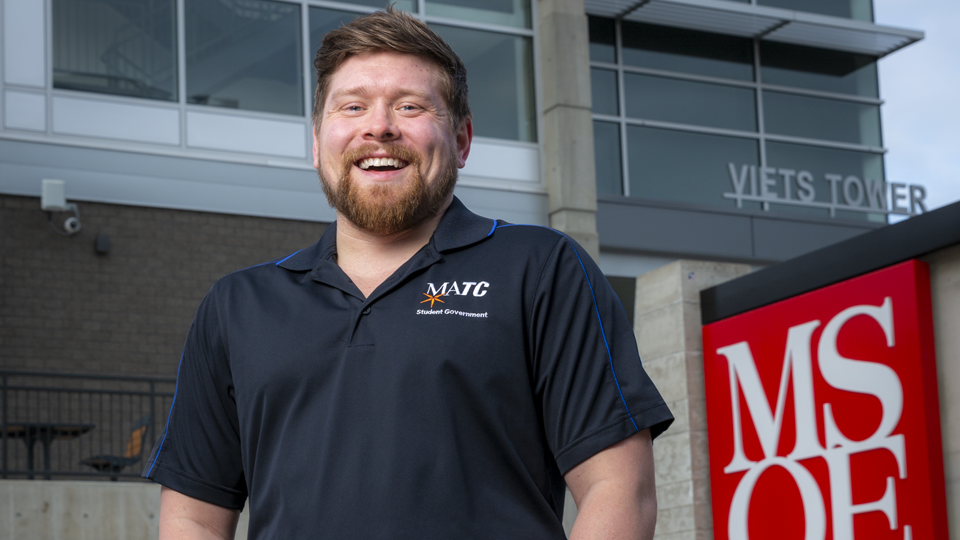
Hunter Burazin at Milwaukee School of Engineering's campus
Seamless transfer process helps MATC graduate earn bachelor's degree from MSOE
The engineering gene hibernated inside Hunter Burazin for years.
In high school, he envisioned himself as an English teacher. But in his first attempt at attending college, he socialized more than he studied.
“It didn’t really work out,” he said.
Burazin spent the next decade waiting tables and serving diners in dozens of restaurants ranging from the tiny Wisconsin Club to fast food eateries. He was also married and had two daughters to support. He knew his life needed to change because serving wasn’t going to pay all the bills.
In 2016, Burazin headed to MATC and laid the groundwork to return to school and study engineering. His grandfather and uncle were engineers, and a career in the field sounded interesting and fun.
Being able to get an education in a technical environment and then transfer to a four-year college was very beneficial. I loved the support I received at MATC.
“I always liked computers and science. Plus, I knew I could support my family in a career that would never go out of style,” Burazin said. “I guess I was inclined to engineering, and once I put my mind to something, I can make it happen.”
Burazin attended MATC for two years, earned an associate degree in electrical engineering technology, then transferred to the Milwaukee School of Engineering, where he received a bachelor’s degree in electrical engineering in May 2022.
Last September, Burazin secured a full-time job at Milwaukee Tool as an electrical engineer on the company’s battery team. He also serves as a volunteer to encourage middle school and high school students to consider careers in science, technology, engineering and mathematics.
“The most important reason I chose MATC was its transfer agreement with MSOE,” said Burazin, who grew up in Franklin and graduated from Waukesha South High School. “Being able to get an education in a technical environment and then transfer to a four-year college was very beneficial. I loved the support I received at MATC — it really helped to get into the mode of being a successful college student.”
At MATC, Burazin served as the college’s state ambassador for the Wisconsin Technical College System. In that role, he participated in a leadership development program and helped extol the value of technical education. Burazin helped increase awareness of the electrical engineering technology program among MATC students; and of science, technology, engineering and mathematics (STEM) courses among local middle school and high school students.
“Hunter was genuinely happy to be in school and managed his school-life stresses well,” said Patricia Berg, one of Burazin’s mathematics instructors at MATC. “After he was done with math, I would see him on campus where he was studying electronic technology. Hunter kept his eyes on the prize.”
Burazin also organized an electrical engineering job forum. Local employers spoke with students about postgraduation expectations, essential interview skills and necessary soft skills needed to be successful in the workforce.
Transferring to MSOE was straightforward and uncomplicated, Burazin said. “The advisors from MSOE walk you through everything — classes to take, schedules, financial aid, registration,” he said. “And all the people at MATC made sure everything was absolutely seamless. They made it very, very easy.”
MATC students with an associate degree in numerous programs can transfer to MSOE to earn bachelor’s degrees in management, electrical engineering, mechanical engineering, and as of Spring 2022, technical sales.
With his electrical engineering degree, Burazin is confident his first postgraduation job is just the start of a lifelong career.
“Electrical engineers can do all sorts of things. There aren’t many things we use that haven’t had an electrical engineer’s hand on them,” Burazin said. “The list of what electrical engineers can’t do is shorter than what we can do.”
For information about MATC's transfer programs, go to matc.edu/transfer

